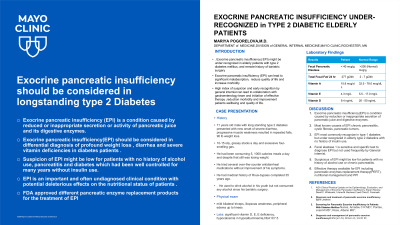Sunday Poster Session
Category: Biliary/Pancreas
P0157 - Exocrine Pancreatic Insufficiency Under-Recognized in Type 2 Diabetic Elderly Patients
Sunday, October 27, 2024
3:30 PM - 7:00 PM ET
Location: Exhibit Hall E

Has Audio
- MP
Mariya Pogorelova, MD
Mayo Clinic
Rochester, MN
Presenting Author(s)
Mariya Pogorelova, MD
Mayo Clinic, Rochester, MN
Introduction: Exocrine pancreatic insufficiency (EPI) might be under recognized in patients with type 2 diabetes mellitus, and remote history of bariatric surgery. EPI can lead to significant malabsorption, reduced quality of life and increase morbidity and mortality. It should be included in differential diagnosis of profound weight loss, chronic diarrhea and severe vitamin deficiencies for diabetic patients with remote history of bariatric surgery during evaluation by general internal medicine provider. High index of suspicion and early recognition can lead to collaboration with Gastroenterology team and initiation of effective therapy.
Case Description/Methods: 71 years old male with long standing type 2 diabetes presented with new onset of severe diarrhea, progressive muscle weakness resulted in repeated falls, 90 lb weight loss. He reported to have 10-15 oily, greasy stools a day and excessive foul-smelling gas. Symptoms started suddenly 8 months ago. He had been consuming 5, 1000 calories meals a day and despite that still was losing weight. He tried several over-the-counter antidiarrheal medications without improvement of his symptoms. He had medical history of Roux-bypass completed 35 years ago. He used to drink alcohol in his youth but not consumed any alcohol since his bariatric surgery. Physical exam confirmed mild bilateral triceps, iliopsoas weakness and peripheral edema up to knees. Laboratory findings revealed significant vitamin D, E, E deficiency, hypocalcemia in hypo albuminemia. Comprehensive malignancy workup was negative with random colon biopsies failed demonstrate any significant abnormality. Imaging demonstrated marked pancreatic atrophy. 48 hours fecal fat studies demonstrated massive steatorrhea and fecal elastase below 40. Pancreatic enzymes replacement therapy with Creon recommended. Two months after initiation therapy diarrhea improved, he was able to decrease calories intake and was able to maintain stable weight.
Discussion: EPI is condition caused by reduction or inappropriate secretion of pancreatic juice and digestive enzymes. Most known causes of EPI chronic pancreatitis, cystic fibrosis, pancreatic tumors. EPI most commonly recognize in type 1 diabetes but under recognized in elderly type 2 diabetics with no history of insulin use. Fecal elastase 1 is sensitive and specific test to diagnose EPI but not used frequently by General internist. Suspicious of EPI might be low for patients with no history of alcohol use or chronic pancreatitis. Effective therapy available for EPI.
Note: The table for this abstract can be viewed in the ePoster Gallery section of the ACG 2024 ePoster Site or in The American Journal of Gastroenterology's abstract supplement issue, both of which will be available starting October 27, 2024.
Disclosures:
Mariya Pogorelova, MD. P0157 - Exocrine Pancreatic Insufficiency Under-Recognized in Type 2 Diabetic Elderly Patients, ACG 2024 Annual Scientific Meeting Abstracts. Philadelphia, PA: American College of Gastroenterology.
Mayo Clinic, Rochester, MN
Introduction: Exocrine pancreatic insufficiency (EPI) might be under recognized in patients with type 2 diabetes mellitus, and remote history of bariatric surgery. EPI can lead to significant malabsorption, reduced quality of life and increase morbidity and mortality. It should be included in differential diagnosis of profound weight loss, chronic diarrhea and severe vitamin deficiencies for diabetic patients with remote history of bariatric surgery during evaluation by general internal medicine provider. High index of suspicion and early recognition can lead to collaboration with Gastroenterology team and initiation of effective therapy.
Case Description/Methods: 71 years old male with long standing type 2 diabetes presented with new onset of severe diarrhea, progressive muscle weakness resulted in repeated falls, 90 lb weight loss. He reported to have 10-15 oily, greasy stools a day and excessive foul-smelling gas. Symptoms started suddenly 8 months ago. He had been consuming 5, 1000 calories meals a day and despite that still was losing weight. He tried several over-the-counter antidiarrheal medications without improvement of his symptoms. He had medical history of Roux-bypass completed 35 years ago. He used to drink alcohol in his youth but not consumed any alcohol since his bariatric surgery. Physical exam confirmed mild bilateral triceps, iliopsoas weakness and peripheral edema up to knees. Laboratory findings revealed significant vitamin D, E, E deficiency, hypocalcemia in hypo albuminemia. Comprehensive malignancy workup was negative with random colon biopsies failed demonstrate any significant abnormality. Imaging demonstrated marked pancreatic atrophy. 48 hours fecal fat studies demonstrated massive steatorrhea and fecal elastase below 40. Pancreatic enzymes replacement therapy with Creon recommended. Two months after initiation therapy diarrhea improved, he was able to decrease calories intake and was able to maintain stable weight.
Discussion: EPI is condition caused by reduction or inappropriate secretion of pancreatic juice and digestive enzymes. Most known causes of EPI chronic pancreatitis, cystic fibrosis, pancreatic tumors. EPI most commonly recognize in type 1 diabetes but under recognized in elderly type 2 diabetics with no history of insulin use. Fecal elastase 1 is sensitive and specific test to diagnose EPI but not used frequently by General internist. Suspicious of EPI might be low for patients with no history of alcohol use or chronic pancreatitis. Effective therapy available for EPI.
Note: The table for this abstract can be viewed in the ePoster Gallery section of the ACG 2024 ePoster Site or in The American Journal of Gastroenterology's abstract supplement issue, both of which will be available starting October 27, 2024.
Disclosures:
Mariya Pogorelova indicated no relevant financial relationships.
Mariya Pogorelova, MD. P0157 - Exocrine Pancreatic Insufficiency Under-Recognized in Type 2 Diabetic Elderly Patients, ACG 2024 Annual Scientific Meeting Abstracts. Philadelphia, PA: American College of Gastroenterology.
